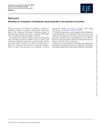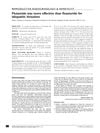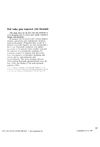 5 citations,
February 2011 in “General and Comparative Endocrinology”
5 citations,
February 2011 in “General and Comparative Endocrinology” Flutamide and finasteride reduced sex hormones in pregnant hyenas, but increased them in males.
 3 citations,
May 2016 in “Gynecological Endocrinology”
3 citations,
May 2016 in “Gynecological Endocrinology” Low-dose flutamide improved hirsutism and satisfaction in women but had common side effects, causing some to stop treatment.
[object Object]  2 citations,
June 2020 in “BMC Health Services Research”
2 citations,
June 2020 in “BMC Health Services Research” Health warnings and public health actions led to a significant drop in flutamide prescriptions for women, but off-label use still continues.
 2 citations,
February 2020 in “Journal of Investigative Surgery”
2 citations,
February 2020 in “Journal of Investigative Surgery” Flutamide-induced hypospadias in rats slows down early wound healing.
 2 citations,
January 2011 in “Andrologia”
2 citations,
January 2011 in “Andrologia” Flutamide and a new synthetic steroid affected brain and prostate chemicals and showed potential for treating androgen-related conditions and epilepsy.
 1 citations,
October 1997 in “PubMed”
1 citations,
October 1997 in “PubMed” Finasteride and flutamide can effectively treat hirsutism, with abdominal hairs showing the most sensitivity to the treatment.
 January 2024 in “European journal of endocrinology”
January 2024 in “European journal of endocrinology” The article was retracted due to data integrity issues.
 November 2024 in “Gynecological Endocrinology”
November 2024 in “Gynecological Endocrinology” The article's findings are uncertain and should be viewed with caution.
 June 2021 in “Pharmaceutical sciences”
June 2021 in “Pharmaceutical sciences” Flutamide emulgel with 1% Transcutol P absorbs better through the skin than other mixtures.
 September 2012 in “The Egyptian Journal of Histology”
September 2012 in “The Egyptian Journal of Histology” Flutamide caused damage to male rat reproductive organs and may affect fertility.
 December 1999 in “Evidence-based obstetrics and gynecology/Evidence-based obstetrics & gynecology”
December 1999 in “Evidence-based obstetrics and gynecology/Evidence-based obstetrics & gynecology” Flutamide worked better than finasteride for reducing excessive hair growth in women, but had more side effects.
 November 1990 in “Inpharma weekly”
November 1990 in “Inpharma weekly” Flutamide effectively treated hair growth and related symptoms in women, with common side effects like dry skin and hot flushes.
 February 2022 in “Journal of Cosmetic Dermatology”
February 2022 in “Journal of Cosmetic Dermatology” Using both minoxidil and flutamide together is more effective for treating hair loss than using minoxidil alone.
 May 2021 in “medical journal of mashhad university of medical sciences”
May 2021 in “medical journal of mashhad university of medical sciences” The mix of 2% flutamide and 5% minoxidil improves hair thickness more than just 5% minoxidil alone in treating hair loss.
[object Object]  December 2013 in “Faculty Opinions – Post-Publication Peer Review of the Biomedical Literature”
December 2013 in “Faculty Opinions – Post-Publication Peer Review of the Biomedical Literature” Flutamide, an oral anti-androgen therapy, is effective in treating female pattern hair loss, even without systemic androgen excess.
Flutamide effectively treats female pattern hair loss long-term with low doses being safe for the liver.
46 citations,
January 2000 in “The Journal of Clinical Endocrinology and Metabolism” 7 citations,
September 1997 in “PubMed”  204 citations,
February 2000 in “Current Medicinal Chemistry”
204 citations,
February 2000 in “Current Medicinal Chemistry” Antiandrogens like flutamide are effective in treating conditions like prostate cancer and hair loss, but there's a need for more potent versions. Understanding their structure can help develop better treatments.
 108 citations,
January 2003 in “Fertility and Sterility”
108 citations,
January 2003 in “Fertility and Sterility” Flutamide may slightly improve hair loss in women, but finasteride does not work.
 75 citations,
November 2007 in “Clinical endocrinology”
75 citations,
November 2007 in “Clinical endocrinology” Certain medications including flutamide, spironolactone, and others effectively reduce excessive hair growth in women, especially when combined with lifestyle changes.
 75 citations,
March 1999 in “Fertility and sterility”
75 citations,
March 1999 in “Fertility and sterility” Finasteride, CPA, and flutamide are all equally effective in reducing excessive hair growth in women.
55 citations,
March 2000 in “American journal of clinical dermatology” Antiandrogens, particularly flutamide and CPA, are most effective for treating hirsutism, with long-term use needed for best results.
 45 citations,
August 2005 in “Bioorganic & medicinal chemistry”
45 citations,
August 2005 in “Bioorganic & medicinal chemistry” New compounds with carborane showed anti-androgen effects similar to flutamide.
 24 citations,
January 2010 in “Annales d'endocrinologie”
24 citations,
January 2010 in “Annales d'endocrinologie” For women with moderate to severe unwanted hair growth or acne, birth control pills are the first choice, with other medications like cyproterone, spironolactone, flutamide, or finasteride as alternatives, and permanent hair removal should be done with electrolysis or laser.
 9 citations,
April 2015 in “Dermatologic Therapy”
9 citations,
April 2015 in “Dermatologic Therapy” Hormonal therapies, like flutamide and cyproterone acetate, are safe and effective for treating adult women's acne, especially those with hormone imbalance or resistant acne.
 9 citations,
March 1991 in “Endocrinology”
9 citations,
March 1991 in “Endocrinology” Using two drugs together, Flutamide and 4-MA, is more effective for blocking male hormones than using each one alone.
 November 2003 in “Aap Grand Rounds”
November 2003 in “Aap Grand Rounds” Low-dose flutamide-metformin therapy effectively improved PCOS symptoms in adolescent girls.
207 citations,
September 2002 in “The Journal of clinical investigation/The journal of clinical investigation” Blocking testosterone speeds up wound healing in males.
 169 citations,
August 2004 in “Baillière's best practice & research. Clinical obstetrics & gynaecology/Baillière's best practice and research in clinical obstetrics and gynaecology”
169 citations,
August 2004 in “Baillière's best practice & research. Clinical obstetrics & gynaecology/Baillière's best practice and research in clinical obstetrics and gynaecology” Lower doses of treatments for hirsutism and acne in PCOS are effective and cause fewer side effects.
























